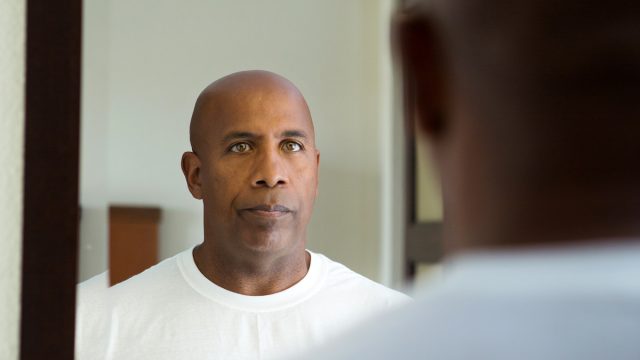The Single Biggest Lie You Need to Stop Telling Yourself
This one lie is doing serious damage to many areas of your life, according to experts.

There are a handful of small lies that we all tell ourselves most days, from saying we're too tired for the gym to that "just one more snooze" mentality. And for the most part, these fibs do no real harm. However, there is one lie that you're constantly telling yourself that is doing serious damage to all areas of your life. The single biggest lie that you tell yourself is: "I'm not good enough." Read on for more on that and then learn The Words Experts Say You Need to Ditch From Your Vocabulary ASAP.
The lie that you're not good enough was at the top of psychotherapist Amy Morin's, LCSW, recent list of things you need to stop telling yourself. The author of the Wall Street Journal bestseller 13 Things Mentally Strong People Don't Do says, "Whether you think you're not smart enough, attractive enough, or ambitious enough, believing you don't measure up can wreak havoc on your self-worth and performance." As for why this notion is so damaging, Morin notes, "If you're convinced you're not good enough, chances are you won't try. You won't put in the effort and work needed to create your dream life."

Valerie Young, PhD, author of The Secret Thoughts of Successful Women, talks of a "secret belief that deep down we're not as bright, capable, competent, or talented as other people seem to think we are, and therefore have this fear of being found out." This idea is often referred to as imposter syndrome, a psychological pattern in which you doubt your accomplishments and fear you'll be exposed as a fraud.
And that tendency to talk ourselves down is more widespread than we think. Recent research by LinkedIn across Europe found that even the most successful businesspeople have struggled in this area, particularly with the recent pandemic. A quarter said that they experienced imposter syndrome during this period, 52 percent at times doubted their ability to lead, and 72 percent have struggled with feeling that they didn't have the answers expected of them.
But the propensity to tell ourselves that we're not good enough isn't just limited to the workplace. "There's this internal false belief that you're not enough [for your partner]," Moraya Seeger DeGeare, licensed therapist and the co-owner of BFF Therapy in Beacon, New York, told Refinery29. "It's the thought that, 'If I show up as my authentic self, this person is going to reject me and I'm not deserving of this relationship.'" She cautions that "it's actually going to limit your intimacy in your relationship if you really aren't addressing this idea that this person deserves someone better."
RELATED: For more up-to-date information, sign up for our daily newsletter.
However, just because self-doubt and imposter syndrome are widespread, that doesn't mean that you have to simply accept these issues. Business coach and mentor Rachel Kelly recently wrote for Forbes about how her own lack of self-esteem, saying, "Understand that the success you seek doesn't happen overnight; it takes time to reconnect back to your inner self and courage to seek help."
Research published in the Journal of Personality and Social Psychology in 2019 backs this up. A study titled "The Link Between Self-Esteem and Social Relationships" found that people's social relationships and their level of self-esteem "is truly reciprocal in all developmental stages across the life span, reflecting a positive feedback loop between the constructs."
So if you recognize yourself saying you're not good enough, start to think about the facts that debunk this common lie you tell yourself. The National Health Service's guidelines suggest starting with small, concrete steps: jotting down when you think negatively, and then writing down evidence that challenges this belief. These can be small things that range from "I'm really good at cryptic crosswords" to "I'm thoughtful." Add to the list, keep it somewhere you see it regularly, and remember: you are good enough and you're only getting better. And for more fibs that shouldn't leave your lips, here are Things You Should Never Lie About, According to Experts.





















